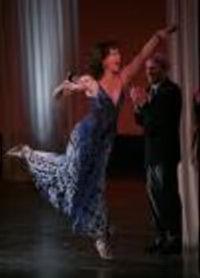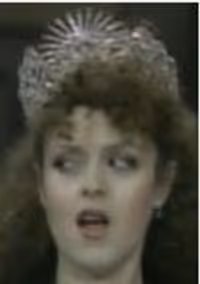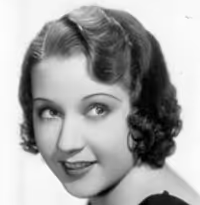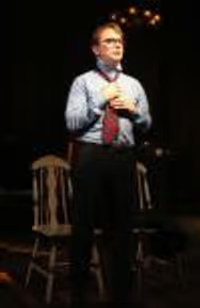Billy Porter: "Blacks Have Replaced The Jews"
#75Billy Porter:
Posted: 8/20/25 at 9:09am
In spite of what I posted previously (although I still stand by what I wrote), I still hold respect for Porter's sense of style IRL, as well as his talent as a singer.
It's occurred to me that although the role of emcee in Cabaret isn't a role he's prepared for, I WOULD like to see what he could bring to the role of Madeline in "Death Becomes Her".
#76Billy Porter:
Posted: 8/21/25 at 1:47am
Jordan Catalano said: "I saw a fellow Jewish theater-loverthis morning say the Billy Porter thing is so bad because he used the word “replace” which brings Charlottesville to mind and I hadn’t even thought of that. The whole “Jews will not replace us”. I think that’s still a very open wound for a lot of people."
This is the FIRST exact thing I thought of. What a tone deaf statement for him to make given the current climate. If the wound had healed it has definitely been reopened with this current rise of Jew hatred. Truly disappointing.
#77Billy Porter:
Posted: 8/21/25 at 2:26am
I know people want to pile on Billy as an individual, and it is pretty shocking he said it right now given he is in Cabaret of all shows AND the level of antisemitism right now is so bad - for example in London of all places I would not be comfortable being openly Jewish right now and I think that is a TERRIBLE and shocking state of the world to be in. Even more shocking is that certain groups try and justify and normalise this antisemitism.
But it seems to me that Billy is just playing into the ‘oppression olympics’ game that our culture has allowed or even rewarded people to play over the last 5 years.
It’s shocking and tone deaf, but if someone is drawing parallels to Charlottesville because the word ‘replace’ happened to be used (even though it’s in a completely different context the only similarity is that the word replace and the word Jews were used in the same sentence) is it not clear that people are getting offended at things that were never intended?
#78Billy Porter:
Posted: 8/21/25 at 6:45pm
Owen22 said: "The Distinctive Baritone said: "Watching the whole clip where he also reveals his nonsensical “backstory” for his version of the Emcee as an American fleeing the Jim Crow South of the 1930s leads me to believe that he really has no actual “take” on the character - at least not one that is based on the text or the much documented history of how Hal Prince came up with that character and why. As a result, he is unable to answer the interviewers’ questions with any clarity or depth, and his statement about Jews is just him trying and failing to come up with something meaningful to say."
Want to grab him (and almost any other POC who is playing a character non-traditionally) and let them know that they are actually playing WHITE. It'spretend. As much as we're pretending this is WeimerGermany, Billy Porter is playing a white person. As is MarishaWallace. Especially in this production where the MC is more likely than not an actual Nazi! And if not a Nazi, the character is complicit with its all-Aryan desire for Germany!"
Um, no he isn't. He's specifically said he's playing a Black man who escaped from the U.S. south to Germany.
verywellthensigh
Broadway Star Joined: 6/14/22
#79Billy Porter:
Posted: 8/21/25 at 7:12pm
Jarethan said: "kdogg36 said: "MerrilyWePostAlong said: "Looks like Porter has continued to put his foot in his mouth (at least I hope that's all it it) in regards to Jewish people. This video alleges that recently instead of saying "She wouldn't look Jewish at all" he said "She wouldn't be Jewish at all.""
I don't really see much of a difference in terms of the impact of the song's ending. It's intended to be grotesquely anti-Semitic. "Look" works better with the song's visual gimmick - and of course it's the correct lyric -but I have trouble seeing how his mistake alters the meaning in any significant way."
I agree with you. In their zeal to stress how much they hate Billy and his performance, they are going after stupid things. In the original production, Joel Grey sang 'she isn't a meeskite at all.' In the movie, Joel Grey sang 'she doesn't look Jewish at all.' Why would some minor variation on that phrase, if there was one, cause so much 'sturm und drung.? Between this and the emotion about the casting of Maybe Happy Ending, I wonder if these people lead otherwise charmed existences that they should get so worked up.
"
It can't really be under-expressed how new Cabaret was when it was first produced. In their excellent book Colored Lights Kander/Ebb explained that the "she wouldn't look Jewish at all" line was always the line but they changed it because preview audiences gasped and groaned when Grey said it. According to them, preview audiences were a bit cool in their response to the show as a whole but response changed virtually overnight when the critics raves came out.
Whether it was a flub or intentional, it was unfortunate that he did that. The line is a poison punchline, neatly woven into the conceit of the song. "She wouldn't be Jewish at all" doesn't really make any sense. Words and rhythm matter, especially in the theatre. No one goes to Hamlet wanting to hear "O such a rogue and peasant slave I am".
#80Billy Porter:
Posted: 8/22/25 at 10:21am
Jarethan said: "kdogg36 said: "MerrilyWePostAlong said: "Looks like Porter has continued to put his foot in his mouth (at least I hope that's all it it) in regards to Jewish people. This video alleges that recently instead of saying "She wouldn't look Jewish at all" he said "She wouldn't be Jewish at all.""
I don't really see much of a difference in terms of the impact of the song's ending. It's intended to be grotesquely anti-Semitic. "Look" works better with the song's visual gimmick - and of course it's the correct lyric -but I have trouble seeing how his mistake alters the meaning in any significant way."
I agree with you. In their zeal to stress how much they hate Billy and his performance, they are going after stupid things. In the original production, Joel Grey sang 'she isn't a meeskite at all.' In the movie, Joel Grey sang 'she doesn't look Jewish at all.' Why would some minor variation on that phrase, if there was one, cause so much 'sturm und drung.? Between this and the emotion about the casting of Maybe Happy Ending, I wonder if these people lead otherwise charmed existences that they should get so worked up."
IMO, there are HUGE difference between the three stingers of the song because words have meaning.
To begin, the emcee wants the same outcome in all three versions: He’s imploring the audience to “see her through my eyes.” He wants the audience to see the gorilla through his POV. In all three scenarios, the emcee leads the audience’s eyes in one direction, then delivers an unexpected stinger.
Scenario One (the ‘Meeskite’ stinger): The definition of “meeskite” is established earlier in the show as being, “ugly, funny-looking”. There is absolutely no correlation made/implied to religion, or the Jews as a people. When the emcee sings, “She isn’t a meeskite at all”, he’s saying, “If you could see her through my eyes, you wouldn’t think of her as being ugly”. When the the song, Meeskite is/was dropped from the show (like in the movie), the line becomes muddled because the pre-established definition is missing.
Scenario Two (the ‘look’ stinger). The word “look” implies perceptions and pre-conceived notions. In this version, the emcee never mentions that the gorilla is Jewish until the stinger. He leads the audience into applying their perceptions RE: the humor of a man dating a gorilla, and describes her virtues. It’s only after he speaks the stinger that we are forced to apply the unknown element that the gorilla is Jewish. When he says, “she wouldn’t look Jewish at all”, he’s forcing the audience to examine how/why the initial set-up might be perceived so genially, but then make a difference after the knowledge learned in the stinger. In his mind it doesn’t make any difference and "If I hadn't told you, you wouldn't have even noticed".
Scenario Three (the ‘be’ stinger): The word “be” connotes existence. Unlike Scenario Two, to sing, “she wouldn’t be Jewish at all” tells the audience that “in my eyes, her ‘Jewish-ness’ does not exist at all.” It shifts the focus from expecting the audience to examine their perceptions/beliefs to having the emcee direct them to erase its existence from their minds.
The three scenarios are very different. One focuses on physical appearance only, the second asks the audience to examine themselves, and the third instructs the audience to block its existence from their mind.
#81Billy Porter:
Posted: 8/22/25 at 10:50am
The “meeskite” lyric variant was never the original intent; it was always intended to be “Jewish” but was altered at some point in previews. It was rightfully restored in London and cemented in the film. Joel Grey has been on the record as strongly disagreeing with the choice to drop the “Jewish” lyric on Broadway.
I’ve never, ever interpreted the song as you suggest, John. I’ve always seen it as an intentional antisemitic gut punch signaling the shift in the culture of the Kit Kat Club (ie Germany) as the Nazi power grew. It’s not an earnest plea for tolerance or self-examination- it’s a cruel joke, signaled by the fact the song ends in a deliberately comedic playoff. It says to me that the Emcee and the Club have capitulated by playing to their growing Nazi audiences- a song with such a bigoted punchline would not fit in with the Club songs of act one, which send up Weimar decadence.
So, for me, I don’t see much of a difference in “would look” or “would be” because the outcome is the same- the dehumanization of Jews.
#82Billy Porter:
Posted: 8/22/25 at 11:51am
Kad said: "I’ve never, ever interpreted the song as you suggest, John. I’ve always seen it as an intentional antisemitic gut punch signaling the shift in the culture of the Kit Kat Club (ie Germany) as the Nazi power grew. It’s not an earnest plea for tolerance or self-examination- it’s a cruel joke, signaled by the fact the song ends in a deliberately comedic playoff. It says to me that the Emcee and the Club have capitulated by playing to their growing Nazi audiences- a song with such a bigoted punchline would not fit in with the Club songs of act one, which send up Weimar decadence."
Hiya, Kad!
First, I'm glad that you chose to feel comfortable enough to address your response using my first name (pseudonym or not)! I like the relaxed friendliness of it.
Also, (similar to a conversation I was involved in with kdogg in another thread), I don't necessarily disagree with your interpretation of the song, or its role within the show. IMO, the opportunities for varied interpretations that can co-exist are what separate a show designed for musical comedy entertainment from one with enduring substance, as well as being entertaining.
I don't really want to comment on your interpretation, as I think you express interesting ideas, and I want to spend more time thinking about them (for example, I had not considered the song as being "a cruel joke" or "an intentional antisemitic gut punch signaling the shift in the culture of the Kit Kat Club " before, so thank you for that).
I still believe that words have meaning, and that altering a lyric by even one word in a show like Cabaret can alter the intent of the message designed by the lyricist (mistakenly done, or not). Still, to my mind, you've proven that based on interpretation, that degree of "intent" can vary.
#83Billy Porter:
Posted: 8/22/25 at 12:17pm
To be clear, I do not think Porter has intentionally changed the lyric- it seems like a slip-up- and I think "look" is the substantially better word choice there. I also don't want to present my interpretation as the "correct" one- I agree that the beauty of a brilliant piece of art like Cabaret is its ability to be interpreted multiple ways.
I've always seen "If You Could See Her" as a kind of shocking betrayal. The Emcee is the character that the audience becomes attached to- he's the first person we see onstage, he talks to us, jokes with us, guides us into this world, and we know when he's onstage we're gonna have a good time. And that's the case for all of act one. In act two, of course, the reality of Nazi Germany creeps into the Club. But here comes the Emcee, with a twinkle in his eye and a jaunty tune, dancing with a gorilla, singing what seems to be a "love is love is love" song... and then he pulls the rug out from under us, revealing that this plea for tolerance was warped from the start, hinged on the idea that dating a Jew is no different than bestiality. The Club is no longer a safe space from the rising Nazi regime and maybe it never was.
And, of course, the next time the Emcee sings, it's "I Don't Care Much"- a song that can certainly be played in different ways (Cumming seemed to make it a mirror version of Sally's "Cabaret"- they do express similar sentiments- while this revival uses it to suggest that the Emcee is or has become a Nazi sympathizer), but reveals that the Emcee is no real ally to anyone.
#84Billy Porter:
Posted: 8/22/25 at 8:29pm
Kad said: "To be clear, I do not think Porter has intentionally changed the lyric- it seems like a slip-up- and I think "look" is the substantially better word choice there. I also don't want to present my interpretation as the "correct" one- I agree that the beauty of a brilliant piece of art like Cabaret is its ability to be interpreted multiple ways.
I've always seen "If You Could See Her" as a kind of shocking betrayal. The Emcee is the character that the audience becomes attached to- he's the first person we see onstage, he talks to us, jokes with us, guides us into this world, and we know when he's onstage we're gonna have a good time. And that's the case for all of act one. In act two, of course, the reality of Nazi Germany creeps into the Club. But here comes the Emcee, with a twinkle in his eye and a jaunty tune, dancing with a gorilla, singing what seems to be a "love is love is love" song... and then he pulls the rug out from under us, revealing that this plea for tolerance was warped from the start, hinged on the idea that dating a Jew is no different than bestiality. The Club is no longer a safe space from the rising Nazi regime and maybe it never was.
And, of course, the next time the Emcee sings, it's "I Don't Care Much"- a song that can certainly be played in different ways (Cumming seemed to make it a mirror version of Sally's "Cabaret"- they do express similar sentiments- while this revival uses it to suggest that the Emcee is or has become a Nazi sympathizer), but reveals that the Emcee is no real ally to anyone.
"
An odd response to me, though apparently others share it. The MC is clearly a demonic figure, embodying corruption (as, for instance, in "The Money Song," sung right after we learn Ernst has been carrying packages for the Nazis), and I believe he looks on with approval when the waiters sing "Tomorrow Belongs to Me." He enters and seems pleased with the arrangent when it is reprised as direct hostile act towards Schultz. I never thought he was any kind of "good guy" at all.
The response you have towards the MC is the one I have towards the Leading Player when he suddenly reveals Pippen's firey suicide has been his goal all along.
#85Billy Porter:
Posted: 8/23/25 at 8:30am
Kad said: "I've always seen "If You Could See Her" as a kind of shocking betrayal. [...] In act two, of course, the reality of Nazi Germany creeps into the Club. But here comes the Emcee, with a twinkle in his eye and a jaunty tune, dancing with a gorilla, singing what seems to be a "love is love is love" song... and then he pulls the rug out from under us, revealing that this plea for tolerance was warped from the start, hinged on the idea that dating a Jew is no different than bestiality. The Club is no longer a safe space from the rising Nazi regime and maybe it never was."
When I adopt the viewpoint of the MC being untrustworthy, and mercurial regarding any kind of alliance, I see your points clearly, especially re: the 'look/be' discussion.
I hadn't considered the gorilla costume as implying, "dating a Jew is no different than bestiality" but when I adopt that perspective, combined with what you mentioned earlier re: the gleeful playoff, the interpretation makes sense.
And, of course, the next time the Emcee sings, it's "I Don't Care Much"- a song that can certainly be played in different ways (Cumming seemed to make it a mirror version of Sally's "Cabaret" [...])"
I really like the idea of "I Don't Care..." being a mirror of Sally's "Cabaret". Hadn't thought of that before.
#86Billy Porter:
Posted: 8/23/25 at 8:57am
Did not expect this thread to veer into the first actual textual discussion of a show on here in like a year, well done.
Videos






